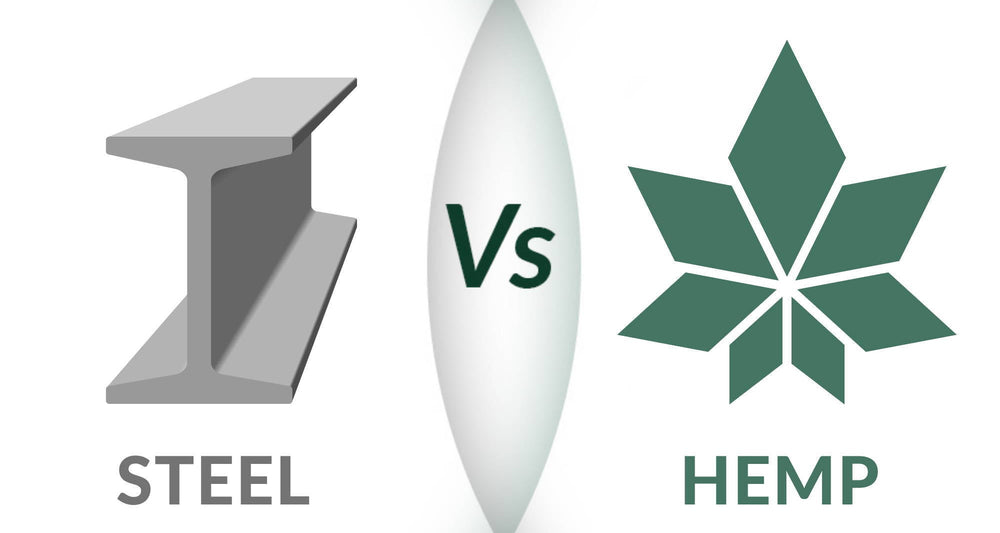
Is Hemp Stronger Than Steel?
|
If you're not happy with your first pair of underwear after trying it on, let us know.
We'll send a new size or color, or give you a refund. No returns needed.

Paulina Kwik
|
You and I know that hemp is more robust in the hemp vs cotton debate, but is hemp stronger than steel? It sounds impossible, but it’s true. Hemp’s strength is one of the reasons why it’s such a great option for sustainable underwear. So whether you buy a hemp bra, high waisted underwear, or mens briefs, you know that you’re wearing some seriously strong undies.
But how could something so soft be so substantial? I dove into the research, and it turns out that hemp’s power comes from a combination of science and how the world measures strength. It sounds crazy (it blew my mind, too), but considering these factors, hemp really is stronger than steel!
When compared to similar materials like cotton and linen, hemp fabric is certainly stronger. But is hemp stronger than steel when it comes to your underwear? No, because you can’t compare the two materials—they’re too different.
But when hemp is manufactured into a similar material like steel, then, yes, it’s stronger. Several individuals and companies have created a solid, plastic-like material from composite hemp fibers. So it’s a lot easier to see how this could be true when comparing hemp plastic with steel.
Compared to steel, hemp plastic is 1,000% stronger, like with the car Henry Ford built with hemp in 1941. One article details how Ford’s hemp plastic car was stronger, weighed 300 pounds less, and had 25% better fuel efficiency than a steel car. So not only was it stronger—it was way lighter, safer, and less expensive to drive!
When manufacturers use plant fibers to create something that looks and feels like plastic, it’s called cellulose plastic. In other words, plastic made from plants, or better known as bioplastic. Bioplastics produce far less greenhouse gas emissions than oil-based, but some are concerned about other forms of pollution, like fertilizers and chemical processing.
But hemp doesn’t require fertilizer and chemicals to grow or produce textiles, making it a go-to resource for bioplastic products. Hemp is also recyclable. But if you forget to recycle it, hemp will still biodegrade in 6 months. So far, hemp is proving to be pretty great—stronger than steel and one of the best sources for bioplastics.
Making hemp plastic is a bit complicated in the science world, but I’ll try to sum it up simply in three steps:
When the liquid hardens, it becomes solid—and a very strong solid! This is how you can compare something like steel to hemp. When processed into a similar form, hemp-based plastic, when compared to steel, is stronger.
There are tons of hemp products out there, including many made with hemp plastic. Plant cellulose can even produce different types of plastics, such as celluloid, cellophane, and rayon.
Close your eyes and think of a world where your favorite brands made plastic with hemp rather than oil. The products you buy, use, and wear are better because they’re stronger, non-toxic, biodegradable, and remove carbon from the atmosphere. I know I’d enjoy a world like that!
If you’re a visual learner like me, you’ll love learning that Henry Ford took a sledgehammer to his hemp car to prove his point that hemp is stronger than steel! It definitely did the trick, but it’s best to measure hemp plastic’s strength using compression and tensile testing.
This method looks at how much tension the weakest variation of a specific material can endure from all sides. Pushing, pulling, bending, hitting, etc., all work to determine the breaking point and elastic limit. WAMA uses tensile testing with all fabric testing, to determine material strength. Because hemp creates such soft, breathable underwear, it’s important to know that it’ll last.
In one study, plant-based fibers (including hemp) had better compression and tensile strengths overall when compared to synthetic fibers. During testing, the study found that hemp’s durability increased when it had a longer, smaller, and denser cluster of fibers. Hemp even beat out glass, carbon, and kevlar fabric, which the military uses.
Let’s visualize it. Imagine you have hemp yarn, and you knit a scarf with a large needle, creating more space between each loop. Now knit a scarf with a small needle, making tighter loops. Which one is probably stronger?
Hemp material works the same. If it’s tightly knit, it has a higher hemp tensile strength. And when the fibers crystalize, melt down, and reform into a plastic-like material (like hemp plastic), they create the ideal density combination—one that’s stronger than steel.
How strong is hemp? Because of hemp’s high tensile strength and how the fibers bind together when producing hemp plastic, it’s 1000% stronger than steel. There are two main reasons for this:
One study showed alloy steel’s tensile strength at 3,000 MPa. In contrast, a journal reported that denser hemp fibers had more than 4,000 MPa. MPa stands for megapascals, a unit to measure pressure. So, is hemp stronger than steel? You bet it is!
With all the factors that make hemp stronger than steel, more and more industries are starting to use it to produce materials, which I love to see.
Hemp Concrete: Traditional concrete has low tensile strength and is prone to deterioration over time. One study added hemp fibers to the mix and made smoother, more durable concrete with a 20% increase in strength.
Hemp Cars: Car companies are following in Ford’s footsteps, producing carbon-negative cannabis cars.
Hemp Bulletproof Vests: Even the military is starting to look into hemp plastic’s strength, making bullet-proof hemp vests, which are much lighter than what members wear today.
When it comes to hemp facts, the rumors are true—hemp is stronger than steel! Almost anything manufactured today can replace its materials with hemp to create a world where everything is stronger, more durable, and less toxic. Imagine wearing hemp clothes, driving a hemp car, living in a hemp house, sitting in a hemp chair to eat your dinner, and storing your leftovers in a hemp container.
What would you want to see made with hemp? Send me your ideas in the comments!
Get updates on restocks, new color and size releases, and upcoming product launches. You’ll also get a 15% discount on your first order of hemp underwear.


